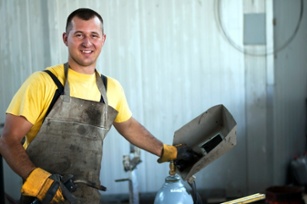
3 Vital Traits Of A Welding Expert That Helps You Meet Budget Goals
June 3, 2016
 While many manufacturers offer welding services, not every supplier is a welding expert. Less knowledgeable metal manufacturers may have trouble meeting your specifications exactly or using more advanced equipment. To qualify as an expert, your supplier should understand robotics and employ highly skilled welders.
While many manufacturers offer welding services, not every supplier is a welding expert. Less knowledgeable metal manufacturers may have trouble meeting your specifications exactly or using more advanced equipment. To qualify as an expert, your supplier should understand robotics and employ highly skilled welders.
Your supplier should also have one or more welding engineers on staff, preferably those qualified as Certified Welding Inspectors (CWI) through the American Welding Society. The CWI exam is rigorous, even for welding engineers that have decades of experience.
The right welding contractor not only knows how to weld parts to your requirements, but it also helps you save significantly on costs. Consider the following three characteristics of a welding expert that helps you meet your budget goals:
1. Collaborative
A supplier’s collaborative process differs for every customer, but at the very least, it should be willing to discuss your project with you in a strategic way. Your welding contractor should try to understand how to meet your request while minimizing time and expenses.
It may ask whether your welding processes must be executed the way you planned, or if more efficient processes can be used to accomplish the end goal. A welding expert listens carefully to your needs. At the same time, it makes recommendations about what processes are truly necessary.
2. Quality-Focused
Your supplier must weld parts correctly and with good fusion. In other words, it needs to focus on minimizing welding defects. Everything from filler metals, the welding crew, quality standards and the right processes need attention and detailed planning.
If your parts aren’t welded to specifications, you have to send them back to be fixed or order new parts, causing costly production downtime. Even worse, your parts may fail. A customer who is 100 feet up in the air in a man lift, or who is using your equipment for similar purposes, depends on your supplier’s welds for his life and safety.
3. Flexible To Change
When market conditions change, your welding contractor must be able to adapt to your demands. Other changes in orders should also be accommodated. For example, you may notice a feature on your product that needs to be changed for safety reasons.
In critical situations like this, your supplier must be flexible to bring your part to its new specifications quickly. Lost time means lost sales, which hit your budget hard.
Your welding contractor’s relationship with its suppliers is also important. As your orders change, welding wire suppliers, welding equipment suppliers and suppliers for tips/guns need to adapt as well. Without the necessary resources, your manufacturer won’t be able to meet your demand, and your own production slows down as a result.
Perhaps most importantly, you need a contract manufacturer characterized by a culture of improvement. It should never be satisfied with the status quo.
The right welding contractor continually makes focused changes at its facility to help increase efficiency and lower costs. While it may already have in-depth knowledge and capabilities, an expert manufacturer knows it can always improve its welding solutions.
Ready to learn more about how Miller could meet your budget goals? Contact us today!
You Might Be Interested In
March 25, 2022
Brookville High School Career Fair